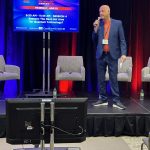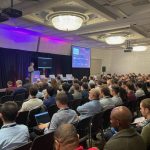Quantum News Briefs June 23: IonQ Forte launched for commercial use, Making #AQ 29 available for customers worldwide;

Quantum News Briefs June 23:
IonQ Forte launched for commercial use, Making #AQ 29 available for customers worldwide
 IonQ, an industry leader in quantum computing, announced on June 22 that it has expanded the commercial availability of its next generation quantum computer, IonQ Forte. Quantum News Briefs summarizes.
IonQ, an industry leader in quantum computing, announced on June 22 that it has expanded the commercial availability of its next generation quantum computer, IonQ Forte. Quantum News Briefs summarizes.
First made available in 2022 through limited access to select partners, the system is now available to customers from around the world, enabling applications that can lead to solutions for today’s most complex problems. With 32 physical qubits, a record algorithmic qubit count of #AQ 29 and the latest hardware integrations, IonQ Forte is advancing performance for new possibilities.
“IonQ Forte represents the culmination of years of research and development from the world’s brightest quantum developers, partners and researchers, and we’re excited to expand availability of the system,” said Peter Chapman, CEO and President, IonQ. “IonQ Forte is designed for customers working on the quantum frontier and provides them with the scale and performance needed to handle larger and more complex problems. IonQ Forte is the latest addition to our world-class portfolio of products – including IonQ Harmony and IonQ Aria – and supports IonQ’s broader goal of making quantum accessible for all types of users and projects.”
A handful of IonQ’s commercial partners including Airbus, Hyundai Motor Company, and Los Alamos National Lab have already started running algorithms on IonQ Forte with promising early results.
IonQ Forte is the third generation of commercially available quantum systems offered by IonQ, alongside IonQ Aria (#AQ 25) and IonQ Harmony (#AQ 11). IonQ Forte replaces a key control system from previous system generations with an acousto-optic deflector (AOD) that results in more accurate qubit control signals and improved quantum gate operation accuracy. This technology, which allows for control lasers to be individually addressed to individual qubits, also results in increased software configurability – a major advancement over existing quantum computers. This unique approach positions IonQ Forte as IonQ’s highest performing system, capable of running wider and deeper circuits than any other commercially available IonQ quantum computer. Click here to read announcement in-entirety.
Columbia, SC nonprofit gets $15M in state budget for quantum computing program
A Columbia, South Carolina nonprofit is getting $15 million from the state budget to make Columbia a hub for quantum supercomputing. Quantum News Briefs summarizes.
The money will create a research, education, and workforce development program around the new technology at the Boyd Foundation Community Innovation Center in Five Points. Cities like Chicago and Chattanooga have implemented similar programs.
“Whether it’s aviation or batteries or pharmaceuticals, it’s going to be impacted by quantum very soon,” said Tech Entrepreneur and co-founder of the South Carolina Quantum Association, Joe Queenan.
The money will also help pay for employees, training, and online courses that will be accessible statewide, Queenan said. The association plans to partner with Benedict College to increase diversity in the field.
“If we’re not really intentional about making sure everyone has a pathway forward to this, we’re doing ourselves a disservice,” said Queenan. He sees this program as a way to stop Columbia’s “Brain Drain” of college students leaving the city to take higher-paying jobs in other states.
The effort has the backing of Columbia Mayor Daniel Rickenmann and the University of South Carolina President Michael Amiridis. State Senator Dick Harpootlian, whose district includes Five Points, is also championing it.
Quantum Computing Inc. appoints Chris Boehmler as new Chief Financial Officer
![]() Quantum Computing Inc.has announced the appointment of Chris Boehmler as its new Chief Financial Officer (CFO). Mr. Boehmler brings extensive financial expertise and a strong background in strategic financial management to QCi. Mr. Boehmler succeeds Chris Roberts, who, in addition to the CFO role, developed and managed the Company’s legal and human resource functions. Mr. Roberts has successfully transitioned the human resource management responsibilities to the Company’s recently-hired human resource director and, as a senior member of the executive team, is continuing in the role of General Counsel and a strategic advisor to the Company as a consultant.
Quantum Computing Inc.has announced the appointment of Chris Boehmler as its new Chief Financial Officer (CFO). Mr. Boehmler brings extensive financial expertise and a strong background in strategic financial management to QCi. Mr. Boehmler succeeds Chris Roberts, who, in addition to the CFO role, developed and managed the Company’s legal and human resource functions. Mr. Roberts has successfully transitioned the human resource management responsibilities to the Company’s recently-hired human resource director and, as a senior member of the executive team, is continuing in the role of General Counsel and a strategic advisor to the Company as a consultant.
Mr. Boehmler, the Company’s newly appointed CFO, has over 20 years of financial expertise, including investment banking, planning & analysis, accounting operations, financial and SEC reporting, systems integrations and financial risks & controls. Prior to joining QCi in early 2022 as the Company’s Controller, Mr. Boehmler had started his career at Credit Suisse and Booz Allen Hamilton supporting financial institutions and government clients, respectively. He went on to hold various senior financial positions at technology companies and financial institutions, including Bridgewater Associates, LP and Intelsat, where he successfully drove financial strategy and managed complex financial operations in high-demand environments. As CFO, Mr. Boehmler will assume a crucial role in overseeing the Company’s financial operations, strategy, and planning as QCi enters material commercialization. He will be responsible for managing the Company’s financial systems, overseeing SEC reporting and investor relations, while also collaborating closely with the executive team to drive strategic initiatives and optimize cost-effective controls while supporting QCi’s anticipated growth. Mr. Boehmler received his BA (Economics) from the University of Chicago. Click here to read complete announcement.
U of Tokyo scientists successfully arranged nanoscale quantum sensors on desired targets
 The delicate work of positioning quantum sensors at the nanoscale as been completed by researchers from the University of Tokyo, enabling them to detect incredibly minute differences in magnetic fields, according to June 14 article by Amit Malewar in TechExplorist.
The delicate work of positioning quantum sensors at the nanoscale as been completed by researchers from the University of Tokyo, enabling them to detect incredibly minute differences in magnetic fields, according to June 14 article by Amit Malewar in TechExplorist.
The project aimed to create stable quantum sensors that could be put close to objects like discs and wires. To date, however, it has been difficult to precisely arrange atoms in a way that allows for the ability to detect minute fluctuations in the magnetic field.
Kento Sasaki, an Assistant Professor at the University of Tokyo, says, “Although individual quantum sensors are small, their spatial resolution is restricted by the distance between the sensor and the measurement target. To solve the problem, the researchers established a technique for creating nano-sized quantum sensors on the surface of the measurement target.”
The team used two-dimensional hexagonal boron nitride, a thin crystalline substance having nitrogen and boron atoms, as quantum sensors. Boron vacancies or lattice defects are found in this material. As a quantum spin sensor discovered in 2020, the boron vacancy defect is the new kid on the block.
Sasaki said, “Scientists are now planning to apply this technique for research on condensed matter physics and quantum materials. It will enable direct detection of the magnetic field from, for example, peculiar states at edges of graphene and microscopic quantum dots.”
Beginning to revolutionize how humans see microscopic environments and hence comprehend macroscopic features are atom-sized quantum sensors. Their uses go beyond fundamental scientific inquiry. They can map subsurface ecosystems, picture human brains, precisely geolocate, and track geological movements and volcano eruptions. The prospective applications of Sasaki and his team’s nanoscale quantum sensors in semiconductors, magnetic materials, and superconductors are still being explored. Click here to read Tech Explorist article in-entirety.
Sandra K. Helsel, Ph.D. has been researching and reporting on frontier technologies since 1990. She has her Ph.D. from the University of Arizona.





















